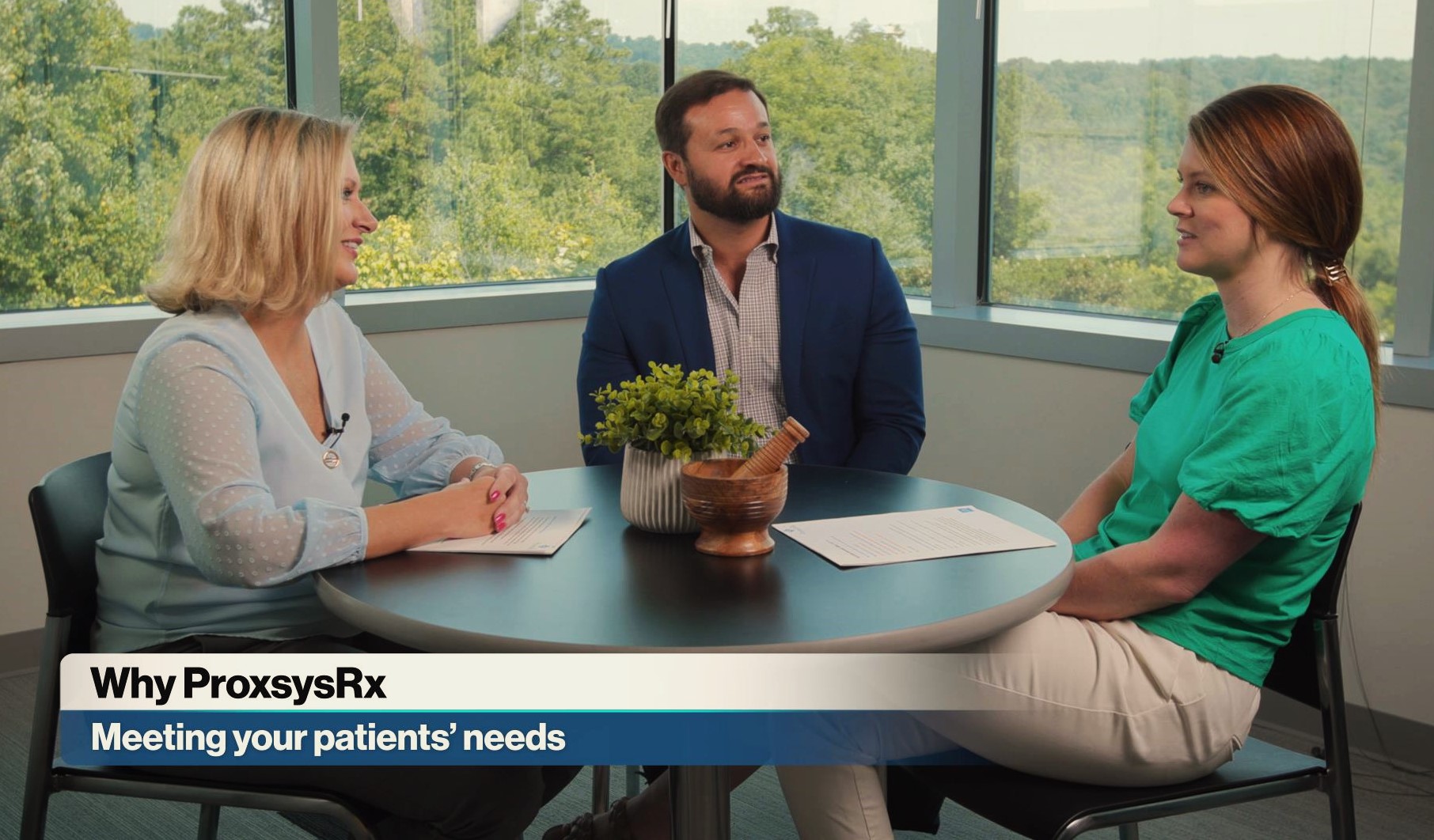Below are highlights of an in-depth roundtable discussion outlining how eligible health systems can ensure the success of their onsite specialty pharmacies. To watch videos of that discussion, organized by topic, Click Here. You can also find a curated transcript of the entire discussion here.
Nurture strong pharmacist / provider relationships
It’s critical that you hire specialty pharmacists capable of building healthy working relationships with your clinic teams. Those relationships ensure an integrated team effort.
Reach-out to manufacturers for partnership opportunities
Bringing a drug to market requires a lot of research, and many manufacturers want active patients on their research medication. Even after a drug is available on the market, manufacturers need data demonstrating how it improves patient outcomes. Specialty pharmacies can partner with manufacturers to provide them that data.
Understand accreditation-requirements before you begin
Building a specialty pharmacy requires everything from certified pharmacists to adequate space and refrigeration equipment — not to mention access to drugs — and there are tough accreditation standards to meet. So make sure you have the physical and personnel resources needed to accommodate the undertaking before you commit.
Identify prescriptions you can fill before accreditation
While accreditation can take 6 months to a year, you can actually start filling some 340B prescriptions on Day One. ProxsysRx helps the health systems we support find prescriptions they can fill immediately, as we work towards their accreditation. We also manage the process of getting them in the networks with the PBMs to be able to fill prescriptions,
Establish processes to uphold reporting guidelines
While you need to meet reporting guidelines at all times, it’s especially important to have your processes in place if you’re filling prescriptions before you’re accredited — which can take six months to a year. As you’re filling prescriptions and getting in the PBM networks, ideally, you’re perfecting the processes, procedures and policies needed to become accredited.
Maintain phone-call metrics
When you become accredited, you have to keep certain metrics for your phone calls. Specialty pharmacies must have someone in the pharmacy, every single hour it’s open, available to answer phone calls promptly. In a ProxsysRx specialty pharmacy, “promptly” means within 30 seconds; which ensures that our patients always have access to a pharmacy professional who can answer their questions — and make sure they’re getting the appropriate care.
Pharmacy service-data reporting
In addition to phone-call metrics, there are patient monitoring and clinical assessments that have to be tracked, measured and reported to PBMs and accrediting bodies.
Providing clinical assessment support
For specialty-medication patients, pharmacists conduct initial assessments — determining, for instance, what medications they’re on, and drug interactions they might be at risk for. After that, pharmacists should work hand-in-hand with providers, to make sure that patients’ medication regimens are appropriate, up to date, and accurate for their disease states.
Continuous monitoring & reporting
In addition to providing post-discharge monitoring, specialty pharmacies should monitor patients monthly — reviewing any side effects they may be having, any other issues they have taking their medication, and even if they’re having trouble storing their medication. ProxsysRx’s pharmacists also ask patients if they’ve skipped any medications, and if it’s affected their disease states. All of that is reported back to the accrediting bodies, to confirm that we’re actually doing what we say.
Ensuring patient satisfaction with your specialty pharmacy’s support
Patient satisfaction surveys are also required, and they’re required by independent third parties — to ensure that you uphold the very high standards set for specialty pharmacies. Our specialty pharmacists also work closely with providers, to make sure they know what it takes to ensure that patients know we (and they) care about their outcomes, and that they have the access to the appropriate medication.
Specialty pharmacy shipping & packaging protocols
Most, if not all, of the medications specialty pharmacies dispense are delivered to a patient’s door. A lot of those medications require refrigeration. Some need to be frozen. Some need to stay at room temperature, and can’t get too hot or cold. All of which is why specialty pharmacies have to implement shipping and packaging protocols appropriate for each medication’s temperature needs. ProxsysRx has a network of specialty vendors, and we have processes for vetting new vendors’ capabilities.
Integrating specialty pharmacy technology with the health system’s
You’ll need a technology platform, like ProxsysRx’s, that can pull all the data — and create the necessary outlooks and outputs. Data you can then report back, not only for accreditation, but also to the payers — the PBMs. That way, when you get your specialty pharmacy In Network for a patient’s PBM, you can bill for the patient’s care. You also have to report a lot of metrics to your PBMs, and to the manufacturers, to get access to their medications.
Integrating specialty pharmacy with 340B
Your 340B eligibility is important to the impact a specialty pharmacy can have on your health system. Your 340B and specialty teams both need to understand the best practices for working within your hospital’s 340B program. They should understand how to optimize opportunities for your clinics to affordably fill your patients’ prescriptions with your hospital’s pharmacies — retail and specialty.
A well-managed 340B program that’s integrated with your retail pharmacy can generate millions of dollars in revenue while your specialty pharmacy is being built.
Avoiding negative reimbursements
One of the easiest ways to cause negative reimbursement is not paying attention to the 340B status of a particular dispense. Especially if you’re a DSH hospital, where you’re subject to the GPO prohibition — in which case, you’ll be hit with purchasing the drug at Wholesale Acquisition Cost, rather than on the 340B account, if it doesn’t qualify.
Performing prior authorizations (1 of 2)
Many PBMs will not pay for prescriptions right out of the gate, so there are a lot of hurdles you have to jump for payors, in order to get drugs covered. Even after a 340B specialty drug is covered, the copay can be very high — sometimes thousands of dollars.
Securing copay assistance for specialty drugs
Most patients can’t afford copays that high, so you need to know all the available options for copay assistance. There are manufacturer programs, and other assistance programs — including charity care and 340B pricing options That’s another benefit of having pharmacists embedded in the clinics where your patients are, because the pharmacists in those clinics are able to secure that assistance even before patients get to the specialty pharmacy.
Performing prior authorizations (2 of 2)
Your specialty pharmacists need to know how to perform prior authorizations, making sure that prescriptions are going to be paid for, and that patients can afford them. Ideally, before any patient gets to the specialty pharmacy, there’s been a conversation with the pharmacist dispensing the drug — to ensure that they’re able to fill the patient’s prescriptions, and the remaining patient copay is something the patient can afford.
Creating a strong retail / specialty pharmacy relationship
Very often, patients have prescriptions from both a hospital’s retail pharmacy and its specialty pharmacy. Having both ensures that those patients get all their prescriptions, with no delays on either. Both pharmacy teams should know what the other is doing, as far as providing for those patients — even to the point of combining prescriptions in single shipments.
Addressing patient questions about their specialty medications
Often, patients can get answers from their retail pharmacists. For high-complexity specialty meds, patients would be connected with a clinical pharmacist familiar with their disease states. Your clinical pharmacists should also speak with patients before each refill, to answer questions and check for medication effectiveness and side effects.
Choose a partner who’s committed to your mission
If you choose ProxsysRx to support your health system’s mission, we only pay ourselves from the revenue and savings we generate on your behalf.
We take-on all the risk, so you’re never exposed to even the potential for loss.
To learn more, schedule a preliminary conversation today!
URAC Accredited
The ProxsysRx specialty pharmacy team is accredited by URAC, the medical profession’s gold standard for third-party validation of high-quality health care.
ProxsysRx is the only accredited company that offers hospitals a comprehensive range of consultative and hands-on pharmacy-related support services.
The single greatest benefit URAC’s validation offers your health system is a significant reduction in the calendar time, and in the personnel time-investment, required to earn the accreditation you need to own a successful specialty pharmacy.
<<<PREVIOUS
How Can Your 340B Hospital Pay For Its Own Specialty Pharmacy?



